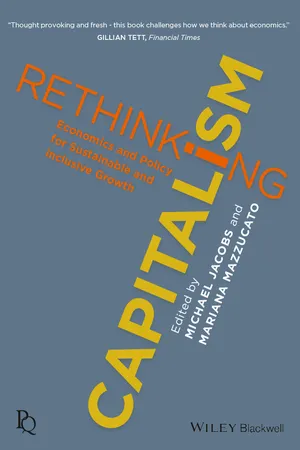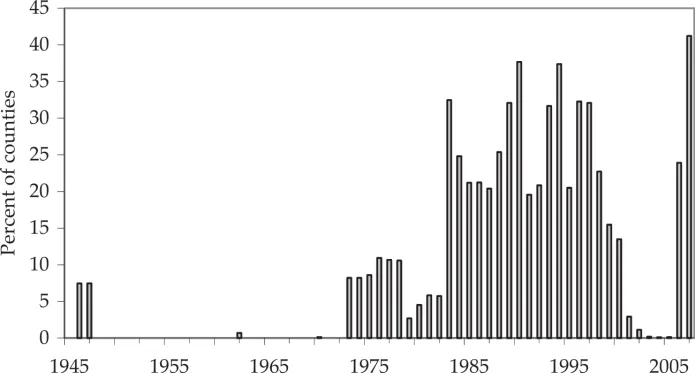
Rethinking Capitalism
Economics and Policy for Sustainable and Inclusive Growth
- English
- ePUB (mobile friendly)
- Available on iOS & Android
Rethinking Capitalism
Economics and Policy for Sustainable and Inclusive Growth
About this book
"Thought provoking and fresh - this book challenges how we think about economics."
Gillian Tett, Financial Times
For further information about recent publicity events and media coverage for Rethinking Capitalism please visit http://marianamazzucato.com/rethinking-capitalism/
Western capitalism is in crisis. For decades investment has been falling, living standards have stagnated or declined, and inequality has risen dramatically. Economic policy has neither reformed the financial system nor restored stable growth. Climate change meanwhile poses increasing risks to future prosperity.
In this book some of the world's leading economists propose new ways of thinking about capitalism. In clear and compelling prose, each chapter shows how today's deep economic problems reflect the inadequacies of orthodox economic theory and the failure of policies informed by it. The chapters examine a range of contemporary economic issues, including fiscal and monetary policy, financial markets and business behaviour, inequality and privatisation, and innovation and environmental change. The authors set out alternative economic approaches which better explain how capitalism works, why it often doesn't, and how it can be made more innovative, inclusive and sustainable. Outlining a series of far-reaching policy reforms, Rethinking Capitalism offers a powerful challenge to mainstream economic debate, and new ideas to transform it.
Frequently asked questions
- Essential is ideal for learners and professionals who enjoy exploring a wide range of subjects. Access the Essential Library with 800,000+ trusted titles and best-sellers across business, personal growth, and the humanities. Includes unlimited reading time and Standard Read Aloud voice.
- Complete: Perfect for advanced learners and researchers needing full, unrestricted access. Unlock 1.4M+ books across hundreds of subjects, including academic and specialized titles. The Complete Plan also includes advanced features like Premium Read Aloud and Research Assistant.
Please note we cannot support devices running on iOS 13 and Android 7 or earlier. Learn more about using the app.
1.
Rethinking Capitalism: An Introduction
Capitalism and its discontents
Weak and unstable growth

Table of contents
- Cover
- Table of Contents
- Title
- Copyright
- Dedication
- Acknowledgements
- Notes on Contributors
- 1. Rethinking Capitalism: An Introduction
- 2. The Failure of Austerity: Rethinking Fiscal Policy
- 3. Understanding Money and Macroeconomic Policy
- 4. The Costs of Short-termism
- 5. Innovative Enterprise and the Theory of the Firm
- 6. Innovation, the State and Patient Capital
- 7. Investment-led Growth: A Solution to the European Crisis
- 8. Inequality and Economic Growth
- 9. The Paradoxes of Privatisation and Public Service Outsourcing
- 10. Decarbonisation: Innovation and the Economics of Climate Change
- 11. Capitalism, Technology and a Green Global Golden Age: The Role of History in Helping to Shape the Future
- Index
- End User License Agreement